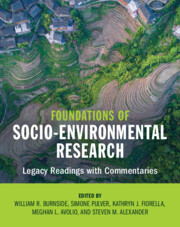Book contents
- Frontmatter
- Dedication
- Contents
- Contributors
- Foreword
- Acknowledgments
- Introduction
- Part I Early Classics of Socio-Environmental Research
- Part II The Roots of Socio-Environmental Research in Geography and Anthropology
- Part III Socio-Environmental Research in Economics, Sociology, and Political Science
- Part IV Socio-Environmental Research in Ecology
- Part V Ethical, Religious, and Historical Approaches to Socio-Environmental Research
- Part VI Technology, Energy, Materials, and Socio-Environmental Research
- Conclusion
Part I - Early Classics of Socio-Environmental Research
Published online by Cambridge University Press: 18 November 2022
- Frontmatter
- Dedication
- Contents
- Contributors
- Foreword
- Acknowledgments
- Introduction
- Part I Early Classics of Socio-Environmental Research
- Part II The Roots of Socio-Environmental Research in Geography and Anthropology
- Part III Socio-Environmental Research in Economics, Sociology, and Political Science
- Part IV Socio-Environmental Research in Ecology
- Part V Ethical, Religious, and Historical Approaches to Socio-Environmental Research
- Part VI Technology, Energy, Materials, and Socio-Environmental Research
- Conclusion
Summary
A network of Enlightenment-era intellectuals debated processes still with us, such as industrialization. The endurance of their ideas reflects their status as mostly privileged white European men. They debated the big questions. Some saw socio-environmental relationships as subject to natural laws. Malthus and Liangji argued that human populations will outstrip food supplies, Ricardo that population growth will increase land rents, and Jevons that efficiency will increase natural resource use. Marx favored historical explanations, considering food poverty and soil degradation to be alterable and functions of linked social and environmental systems. Romanticism vied with materialism. Von Humboldt glorified nature as being in harmony which humans could disrupt. His voyages inspired Darwin, who viewed nature as instead emerging from Malthusian logic, with organisms evolving in conflict over resources. Though inspired by Humboldt, Marsh rejected a view of nature as all-powerful given the environmental destruction he documented. Ultimately, these authors debated whether a better world is possible, a topic still timely as climate change, extinction, and disease threaten us.
- Type
- Chapter
- Information
- Foundations of Socio-Environmental ResearchLegacy Readings with Commentaries, pp. 13 - 24Publisher: Cambridge University PressPrint publication year: 2022

